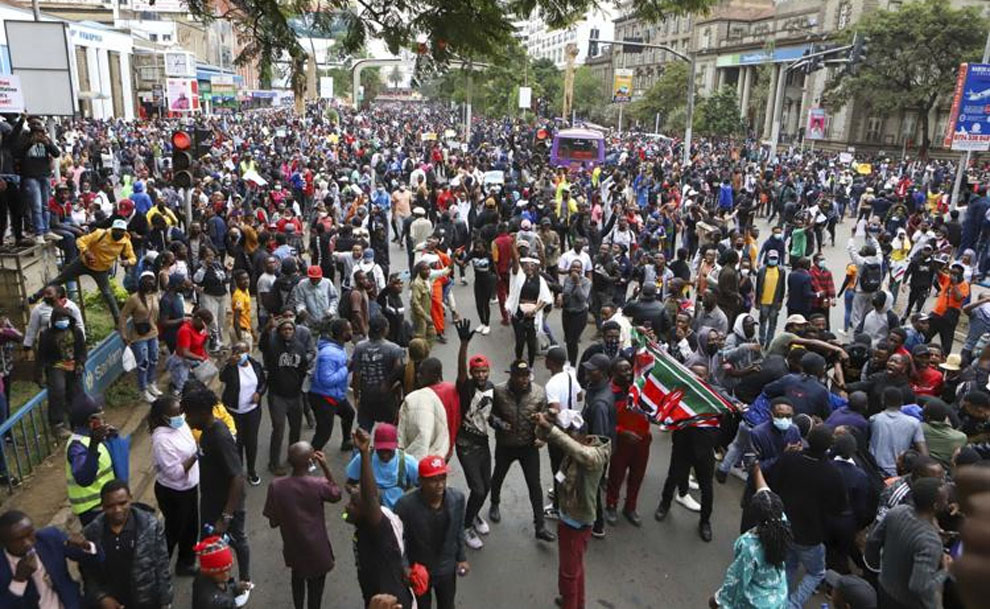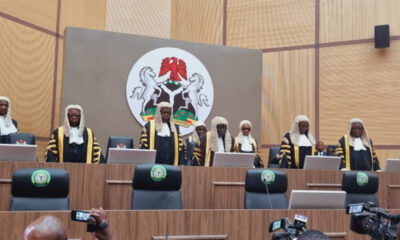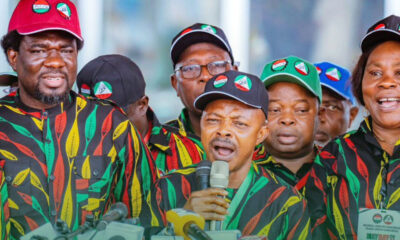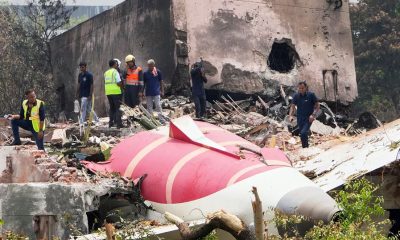Africa
Kenya investigates police conduct in protests over new tax plan

Kenya investigates police conduct in protests over new tax plan
Nairobi, Kenya – An investigation has been initiated in Kenya concerning police conduct during protests against a government plan to implement new taxes, the country’s police watchdog announced on Friday.
Anne Makori, chairperson of Kenya’s Independent Policing Oversight Authority (IPOA), praised the peaceful nature of the protesters and urged police restraint. She acknowledged the tragic killing of a protester and the injuries sustained by both demonstrators and police officers.
Protest Details and Casualties
On Thursday, thousands of protesters marched through Nairobi and other major cities and towns across Kenya. They demanded that legislators reject a finance bill that proposes new taxes. The peaceful protests were marred by violence, leading to casualties.
The mother of Rex Munyao, a 29-year-old man killed during the protests, recounted the events leading to his death. Gillian Munyao stated her son was returning from work when tear gas was fired in his direction, and police opened fire on fleeing protesters. Rex was struck in the leg and, despite pleas for assistance, police allegedly refused to help him, leading to his death from heavy bleeding.
The Kenya Red Cross Society reported 39 injuries, with 8 individuals in critical condition. However, a joint statement by several organizations, including the Law Society of Kenya and Amnesty International, indicated that at least 200 people were injured during the protests.
Calls for Accountability
The International Commission of Jurists (ICJ) called on the IPOA to investigate instances of police violence during the demonstrations. ICJ Chairperson Protas Saende emphasized that using live bullets against protesters is “disproportionate and unlawful.”
READ ALSO:
- Peter Obi didn’t create Obidient Movement, says Aisha Yesufu
- Falana, other lawyers fault court ruling on Sanusi, Bayero dispute
- Red Cross says 22 killed in strike near its Gaza office
Despite the documented injuries and the death of Rex Munyao, the police have not commented on the casualties. Inspector General Japhet Koome released a statement affirming that officers would not tolerate attempts by demonstrators to occupy critical government infrastructure.
Protesters attempting to reach the parliament buildings, where the finance bill debate was ongoing, were met with water cannons, tear gas, and either rubber or live bullets.
Finance Bill Controversy
The contentious finance bill proposes several new taxes, including medical insurance levies, taxes on vegetable oil, and an additional fuel levy. The bill passed its second reading, with a final vote expected next week. The government has made some amendments to the bill, removing a value-added tax on bread and an eco-levy on goods that would have increased the prices of sanitary towels and diapers.
Broader Implications
The protests reflect widespread dissatisfaction with the proposed tax measures, which many Kenyans see as an additional burden in an already challenging economic environment. The ongoing investigation and subsequent findings by the IPOA will be critical in addressing public concerns about police conduct and ensuring accountability.
As Kenya navigates this period of political and social unrest, the government’s response to both the protests and the concerns raised about police actions will be closely watched by both domestic and international observers.
Kenya investigates police conduct in protests over new tax plan
Africa
JUST IN: ECOWAS Declares State of Emergency Across West Africa Amid Rising Coups

JUST IN: ECOWAS Declares State of Emergency Across West Africa Amid Rising Coups
The Economic Community of West African States (ECOWAS) has declared a regional state of emergency following a surge of coups and mutinies in the sub-region, signaling urgent measures to protect democracy and regional security.
The announcement was made by ECOWAS Commission President Omar Touray on Tuesday during the 55th session of the Mediation and Security Council at the ministerial level in Abuja, Nigeria. Touray emphasized that the developments “highlight the imperative of serious introspection on the future of our democracy and the urgent need to invest in the security of our community.”
The emergency declaration comes in the wake of a string of unconstitutional power grabs, including the recent failed coup in Benin, where rogue soldiers briefly seized state institutions before loyalist forces, supported by regional intervention, restored constitutional order. (Reuters)
READ ALSO:
- Nigeria, Saudi Arabia Seal New Defence Cooperation Deal to Boost Security
- Nationwide Glo Network Outage Disrupts Data Services Across Nigeria
- BREAKING: Senate Approves Tinubu’s Request to Deploy Nigerian Troops to Benin
Under the new posture, ECOWAS plans to activate its Standby Force and coordinate with member states to prevent further destabilization, safeguard borders, and protect vulnerable populations, including potential refugee flows across the West Africa region.
Security analysts note that West Africa has faced several recent coups and botched mutinies, raising concerns about the durability of democratic institutions. ECOWAS’ state of emergency is a decisive step aimed at deterring future attempts to overthrow legitimate governments and reinforcing the bloc’s role as a guarantor of constitutional order and regional stability.
Touray affirmed that ECOWAS’ proactive stance demonstrates the bloc’s commitment to preventing the spread of insecurity, protecting cross-border trade, and ensuring that democracy and human rights remain central to West Africa’s development.
JUST IN: ECOWAS Declares State of Emergency Across West Africa Amid Rising Coups
Africa
Nigeria withdraws fighter jets as Benin recovers after failed coup attempt

Nigeria withdraws fighter jets as Benin recovers after failed coup attempt
Nigeria has withdrawn the fighter aircraft it deployed in the Benin Republic following Sunday’s attempted coup, after security assessments confirmed that the situation in the neighbouring country has stabilised. Security sources said the aircraft—initially dispatched from Lagos for surveillance and regional monitoring—were recalled on Sunday afternoon when updated intelligence indicated that the crisis no longer posed “immediate threat to Nigeria’s territorial security.”
The failed coup, aimed at toppling the democratic government of President Patrice Talon, began with an early morning assault on the presidential residence in Cotonou.
Mutinous soldiers, dressed in full military uniform, attempted to seize power but were repelled by loyal forces. Unable to capture the President, the rebels proceeded to take over the Office de Radiodiffusion et Télévision du Bénin (ORTB), briefly controlling the national broadcast signal.
The crisis escalated rapidly, but the Beninese National Guard responded decisively, surrounding the television station and blocking the mutineers’ escape routes.
By late Sunday, loyalist security units had secured all major government installations, restoring order across the capital city.
READ ALSO:
- Dozen Soldiers Held as Benin Govt Thwarts Coup Against President Patrice Talon
- Benin govt says coup attempt foiled as soldiers seize state TV, gunfire rocks Cotonou
- BREAKING: Soldiers Announce Coup in Benin Republic, Declare President Patrice Talon Removed
“The situation is under control. The National Guard has everything surrounded,” a senior security official said, noting that negotiations were initiated to persuade the barricaded mutineers to surrender peacefully.
President Talon, reported safe in an undisclosed location, has yet to address the nation. Meanwhile, the streets of Cotonou remained tense but calm, with no reports of widespread violence or civilian casualties.
Presidential spokesman Bayo Onanuga confirmed in a statement on X that the coup had collapsed.
“Mutineers in military uniform who attempted to overthrow President Patrice Talon’s democratic government have failed. They seized the National TV after failing to enter the presidential residence,” he wrote.
He added that Colonel Pascal Tigri, the alleged leader of the mutiny, was on the run, while several members of the group had been apprehended.
Benin’s Interior Minister Alassane Seidou also appeared on national television, confirming that the military uprising had been foiled. “Early on Sunday, 7 December 2025, a small group of soldiers launched a mutiny aimed at destabilising the state and its institutions. The armed forces remained loyal to the republic, and their response allowed them to foil the attempt,” he said.
The Beninese government has since urged citizens to resume their normal activities, assuring the public that the security situation remains firmly under control.
Nigeria withdraws fighter jets as Benin recovers after failed coup attempt
Africa
Dozen Soldiers Held as Benin Govt Thwarts Coup Against President Patrice Talon

Dozen Soldiers Held as Benin Govt Thwarts Coup Against President Patrice Talon
Authorities in Benin Republic have arrested about a dozen soldiers following Sunday’s attempted coup, with security and military sources confirming that several of the suspected masterminds are already in custody. According to reliable sources, at least 13 suspects have been detained, including one former service member.
The arrests came after a group of military officers stormed the national broadcaster on Sunday morning, declaring that President Patrice Talon had been removed and that all state institutions had been dissolved. The officers, who identified themselves as the Military Committee for Refoundation, claimed to have taken control of government operations.
However, the presidency swiftly debunked the announcement, assuring citizens that President Talon remained safe and that loyal forces had regained control of critical installations.
READ ALSO:
- Benin govt says coup attempt foiled as soldiers seize state TV, gunfire rocks Cotonou
- BREAKING: Soldiers Announce Coup in Benin Republic, Declare President Patrice Talon Removed
- Nigerian Army Suspends Retirements for Officers Amid Nationwide Security Emergency
“This is a small group of people who only control the television. The regular army is regaining control. The city and the country are completely secure,” the presidency said.
Government officials have described the uprising as the action of a fringe faction with no real command of state power. The Interior Ministry also confirmed that the coup attempt was foiled within hours, following coordinated military intervention across Cotonou.
The thwarted coup has drawn immediate reactions from regional bodies, with ECOWAS and the African Union condemning the attempted takeover and calling for strict adherence to constitutional order. The incident adds to rising concerns over political instability in West Africa, which has witnessed a wave of military takeovers in recent years, including in Niger, Burkina Faso, Mali and Guinea-Bissau.
Security analysts say the swift suppression of the rebellion demonstrates the resilience of Benin’s democratic institutions, even as the country remains on high alert for collaborators or remaining pockets of resistance.
Dozen Soldiers Held as Benin Govt Thwarts Coup Against President Patrice Talon
-

 Business3 days ago
Business3 days agoNigeria FX Market: Dollar Demand Surges, Naira Slides Slightly in Festive Season
-

 Politics3 days ago
Politics3 days agoAshimolowo Casts Doubt on Obi’s Northern Support as Opposition Coalition Wobbles
-

 metro3 days ago
metro3 days agoEnd Biafra Agitation, Tinubu Has Integrated Ndigbo Into National Development — Umahi
-

 Politics3 days ago
Politics3 days agoPeter Obi Poised to Dump Labour Party as Leadership Crisis Worsens
-

 International3 days ago
International3 days ago(UPDATED) Sydney Bondi Shooting: Anti-Semitic Attack Leaves 16 Dead, 40 Injured
-

 News17 hours ago
News17 hours agoTrump Adds Nigeria to List of Countries Facing US Entry Restrictions Over Security Concerns
-

 News2 days ago
News2 days agoTinubu’s Emergency Declaration Gets Supreme Court Backing in Landmark Judgment
-

 metro2 days ago
metro2 days agoRetired General Alleges Terror Financiers Were Freed Under Buhari Government















